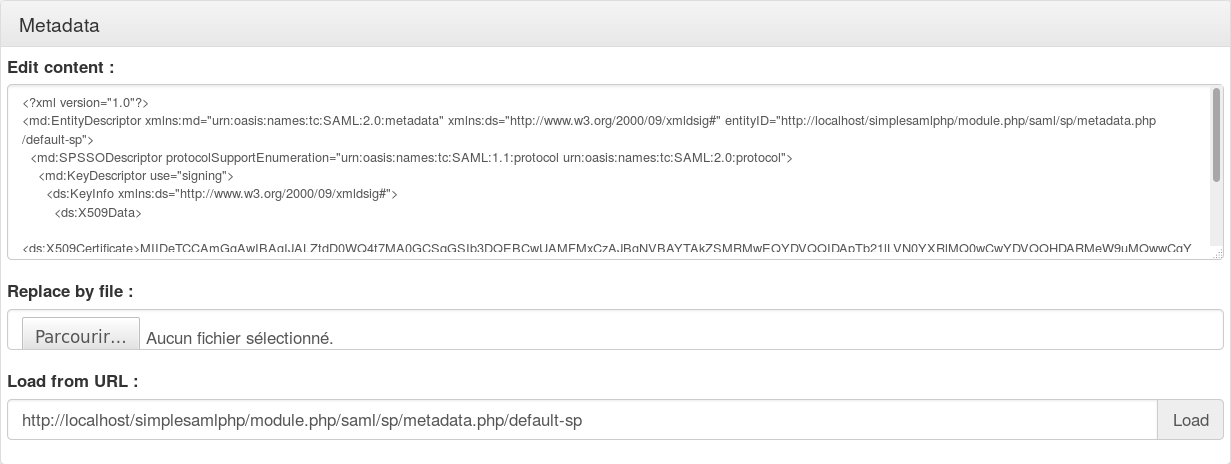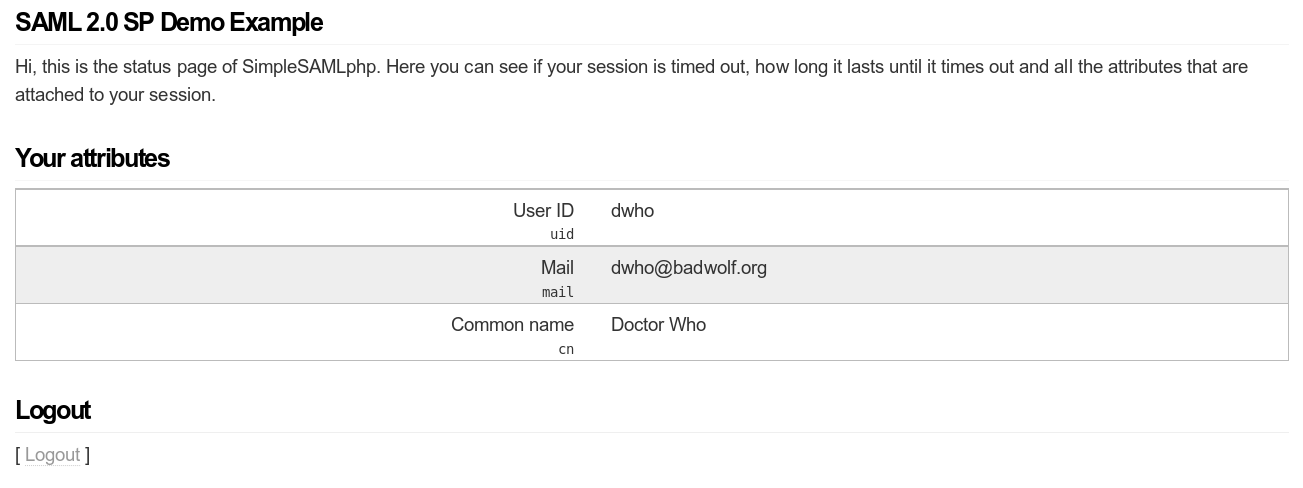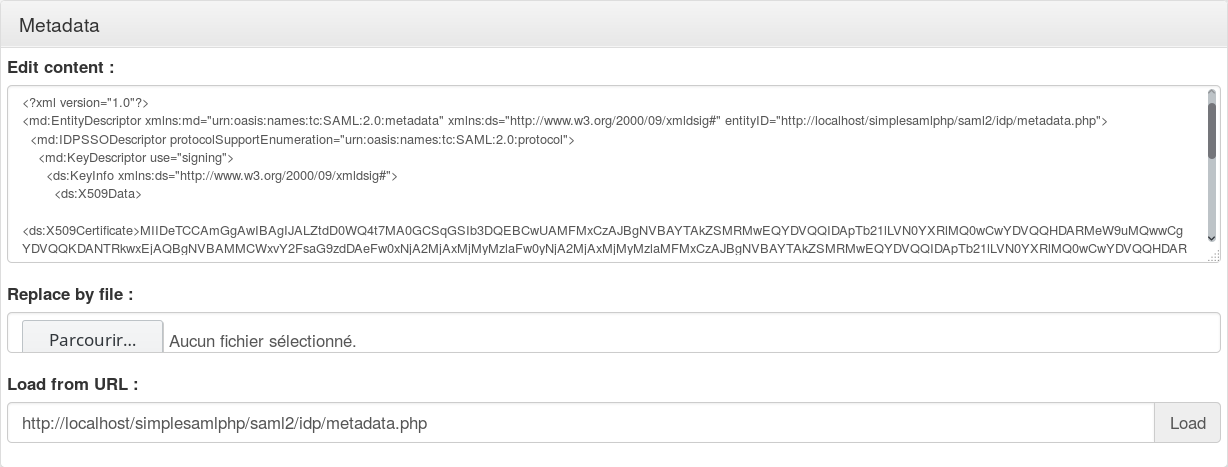simpleSAMLphp¶

Presentation¶
simpleSAMLphp is an identity/service provider written in PHP. It supports a lot of protocols like CAS, OpenID and SAML.
This documentation explains how to interconnect LemonLDAP::NG and simpleSAMLphp using SAML 2.0 protocol.
Pre-requisites¶
simpleSAMLphp¶
You need to install the software. If using Debian, just run:
apt install simplesamlphp
We suppose that configuration is done in /etc/simplesamlphp and that
simpleSAMLphp is accessible at http://localhost/simplesamlphp.
To be able to sign SAML messages, you need to create a certificate. First set where certificates are stored:
vi /etc/simplesamlphp/config.php
'certdir' => '/etc/simplesamlphp/certs/',
Create directory and generate the certificate
mkdir /etc/simplesamlphp/certs/
cd /etc/simplesamlphp/certs/
openssl req -newkey rsa:2048 -new -x509 -days 3652 -nodes -out saml.crt -keyout saml.pem
Then associate this certificate to the default SP:
vi /etc/simplesamlphp/authsources.php
'default-sp' => array(
'saml:SP',
'privatekey' => 'saml.pem',
'certificate' => 'saml.crt',
LemonLDAP::NG¶
You need to configure SAML Service. Be sure to convert public key in a certificate, as described in the security chapter as simpleSAMLphp can’t use the public key.
simpleSAMLphp as Service Provider¶
We suppose you configured LemonLDAP::NG as SAML Identity Provider and want to use simpleSAMLphp as Service Provider.
In LL::NG Manager, create an new SP and load simpleSAMLphp metadata through URL (by default: http://localhost/simplesamlphp/module.php/saml/sp/metadata.php/default-sp):

Then set some attributes that will be sent to simpleSAMLphp:

Tip
Set Mandatory to On to force attributes in
authentication response.
You can also force all signatures:

On simpleSAMLphp side, use the metadata converter (by default:
http://localhost/simplesamlphp/admin/metadata-converter.php) to convert
LL::NG metadata (by default: http://auth.example.com/saml/metadata) into
internal PHP representation. Copy the saml20-idp-remote content:
vi /etc/simplesamlphp/metadata/saml20-idp-remote.php
<?php
$metadata['http://auth.example.com/saml/metadata'] = array (
'entityid' => 'http://auth.example.com/saml/metadata',
...
// Add this option to force SLO requests signature
'sign.logout' => true,
);
?>
Tip
Don’t forget PHP start and end tag to have a valid PHP file.
All is ready, you can now test the authentication (by default: http://localhost/simplesamlphp/module.php/core/authenticate.php). You should see something like that:

simpleSAMLphp as Identity Provider¶
We suppose you configured LemonLDAP::NG as SAML Service Provider and want to use simpleSAMLphp as Identity Provider.
First, you need to activate IDP feature in simpleSAMLphp:
vi /etc/simplesamlphp/config.php
'enable.saml20-idp' => true,
And create a default IDP configuration:
vi /etc/simplesamlphp/metadata/saml20-idp-hosted.php
<?php
$metadata['__DYNAMIC:1__'] = array(
/*
* The hostname for this IdP. This makes it possible to run multiple
* IdPs from the same configuration. '__DEFAULT__' means that this one
* should be used by default.
*/
'host' => '__DEFAULT__',
/*
* The private key and certificate to use when signing responses.
* These are stored in the cert-directory.
*/
'privatekey' => 'saml.pem',
'certificate' => 'saml.crt',
/*
* The authentication source which should be used to authenticate the
* user. This must match one of the entries in config/authsources.php.
*/
'auth' => 'admin',
// Sign SLO messages
'sign.logout' => true,
);
?>
Attention
You need to configure your own certificates and authentication scheme
Now in LL::NG Manager, create a new IDP and import metadata with URL (by default: http://localhost/simplesamlphp/saml2/idp/metadata.php):

List attributes you want to collect:

Tip
You can keep Mandatory to Off to not fail if attribute
is not sent by IDP
And activate all signatures:

To finish, you need to declare LL::NG SP in simpleSAMLphp. Use the
metadata converter (by default:
http://localhost/simplesamlphp/admin/metadata-converter.php) to convert
LL::NG metadata (by default: http://auth.example.com/saml/metadata) into
internal PHP representation. Copy the saml20-sp-remote content:
vi /etc/simplesamlphp/metadata/saml20-sp-remote.php
<?php
$metadata['http://auth.example.com/saml/metadata'] = array (
'entityid' => 'http://auth.example.com/saml/metadata',
...
);
?>
Tip
Don’t forget PHP start and end tag to have a valid PHP file.
All is ready, you can now test the authentication from LL::NG portal.